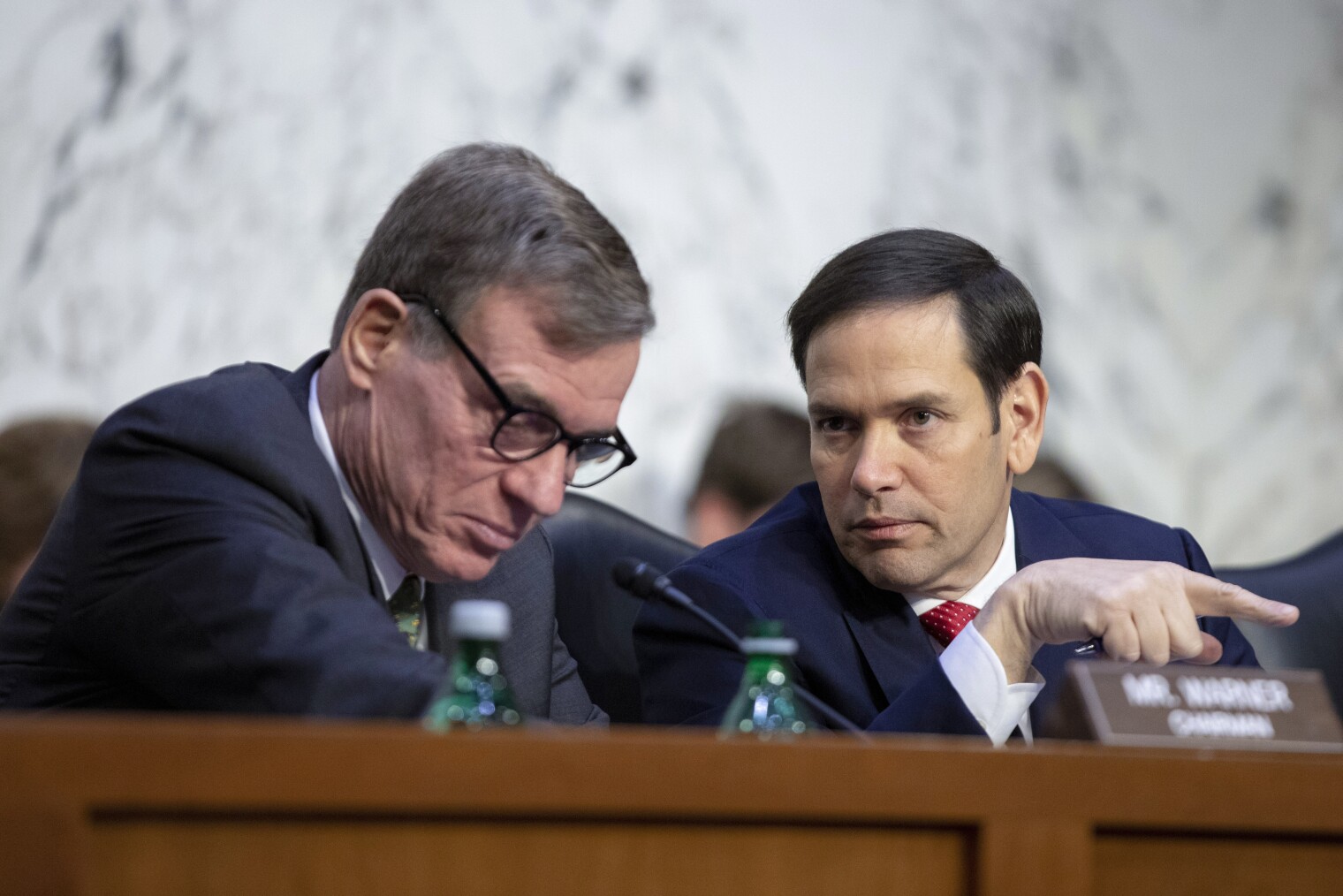 |
| Senate Intelligence Committee Chair Mark Warner (D-VA), left, and Vice Chair Marco Rubio (R-FL) at a hearing in March 2023. (Amanda Andrade-Rhoades/AP) |
Senators Seek to Restrict DOE Lab Visits by Citizens of China, Russia, and Iran
The Senate Intelligence Committee is proposing to prohibit citizens of China, Russia, Iran, North Korea, and Cuba without permanent residence status in the U.S. from visiting Department of Energy national labs or accessing their resources without a waiver. The proposal is contained in the Intelligence Authorization Act that the committee released this month after voting unanimously to advance the bill to the full Senate for consideration.
The legislation states that while “international cooperation in the field of science is critical to the United States maintaining its leading technological edge,” the DOE lab system “is increasingly targeted by adversarial nations to exploit military and dual-use technologies for military or economic gain.” It also states that more than 8,000 citizens from China and Russia were granted access to DOE national labs in fiscal year 2023, out of a total of around 40,000 foreign users of the labs. Many of these visits presumably were to the labs’ scientific user facilities, which DOE historically has made broadly available to external researchers.
The prohibition is not included in the counterpart version of the legislation that the House Intelligence Committee advanced last week. The House bill does, however, include a provision that would require DOE headquarters employees to have the final approvals over foreign national visits in instances where lab officials disagree with the risk assessment of DOE’s counterintelligence office. With both chambers expressing interest in DOE lab access policy, any final version of the legislation will likely address the matter.
Lab access policy may also be modified through the National Defense Authorization Act, which Congress passes each year. Notably, a proposal to prohibit citizens of China and Russia from visiting DOE security labs is included in the version of the NDAA the House passed last week. The White House has objected to that provision on the grounds it would “severely limit our ability to engage with Chinese and Russian experts on nonproliferation of biological, chemical, and nuclear weapons.” This position suggests the White House may push back on the Senate Intelligence Committee’s proposal as well.
Vote Set on Bill to Channel Spectrum Auction Proceeds to Science
Legislation that proposes using federal auctions of electromagnetic spectrum bands to fund R&D programs is scheduled for a vote on Tuesday by the Senate Commerce, Science, and Transportation Committee. (Update: The committee cancelled the meeting.)
Introduced by Committee Chair Maria Cantwell (D-WA), the Spectrum and National Security Act would raise billions of dollars for programs authorized by the CHIPS and Science Act. Specifically, it would provide up to $3.3 billion for the National Science Foundation, $1.7 billion for the National Institute of Standards and Technology, and $2 billion for the Department of Commerce’s Regional Technology and Innovation Hubs program. It would also provide up to $3 billion to expand the department’s semiconductor manufacturing incentives program, which has been in heavy demand. The committee may amend these figures before voting on the legislation.
Cantwell was a chief architect of the CHIPS and Science Act, which appropriated $52 billion for semiconductor initiatives but did not include funding for other science and technology programs it authorized. Congress has not come close to meeting the funding targets set in the act, so the spectrum auction funds would partially make up for that shortfall. Another principal aim of the bill is to reauthorize the government’s authority to conduct spectrum auctions, which lapsed in March 2023. The bill also seeks to improve federal spectrum management procedures and guide R&D initiatives such as national testbeds for dynamic spectrum sharing.
NIH Overhaul Floated by House Republicans
House Energy and Commerce Committee Chair Cathy McMorris Rodgers (R-WA) released a blueprint for restructuring the National Institutes of Health last week that proposes consolidating its 27 institutes and centers into 15 categories and instituting five-year term limits for their directors. Rodgers also proposes NIH implement a national security review as a part of its grant application process, among other research security measures. Her call for overhauling NIH was endorsed by the top House appropriator for the agency, Rep. Robert Aderholt (R-AL). “We support the NIH and the critical role it plays in serving Americans, furthering scientific discovery, and ensuring the U.S. remains the world’s leading pioneer in basic science and biomedical research innovation. But historical support for what an agency should or could be cannot prevent us from seeking to build upon past lessons or correct areas that have fallen short,” they wrote in an opinion piece for Stat. The committee invites the public to submit further ideas for consideration by Aug. 16.
Also On Our Radar
|